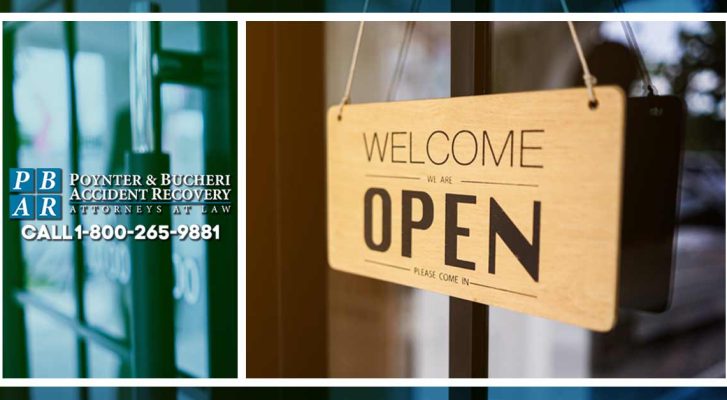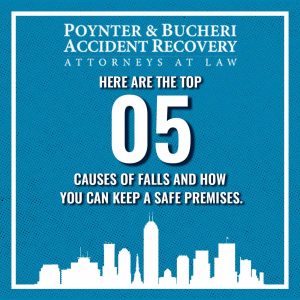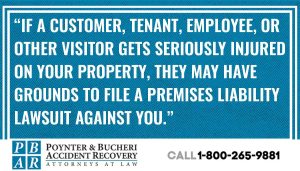
Tips for Shopkeepers to Maintain Secure and Safe Premises

As a property owner or landlord, you have a responsibility and a duty under the legal doctrine of “premises liability” to keep lawful visitors reasonably safe while on your property. This means exercising reasonable care to discover dangerous conditions and preventing personal injury by fixing those hazards or adequately warning visitors.
If a customer, tenant, employee, or other visitor gets seriously injured on your property, they may have grounds to file a premises liability lawsuit against you.
In most states, property owners can be held liable if they fail to fulfill their duty of care and their own negligence directly contributed to someone’s injuries.
Common Premises Liability Cases
A common premises liability case involves slip and fall accidents resulting from wet floors, uneven surfaces, cluttered walkways, and other dangerous conditions. For example, if a business owner fails to clean up a spill promptly, doesn’t address loose floor tiles, or doesn’t trim back overgrown landscaping blocking sight lines, they could potentially be found negligent if a person or tenant is subsequently injured.
The Top 5 Causes of Falls
Wet and Slippery Floors
Floors can become slippery for a variety of reasons, and they often aren’t noticed right away. Floors can become slippery due to spills, leaks, lack of floor mats, or just general cleaning when needed.
When floors are slippery, your duty is to put out adequate signage that warns of the potentially slick surface and clean up the moisture as well as you can. Wet floors can cause a victim to fall quite easily and suffer a serious injury.
Injuries Around Swimming Pools
Property owners also have an implied promise around a swimming pool under laws in most states. Homeowners with backyard pools are responsible for keeping the property safe by installing proper barriers and preventing access when supervision is lacking.
Likewise, hotels and other facilities must follow safety regulations relating to pools. If negligent maintenance or supervision leads to a pool injury or wrongful death, the property owner often faces premises liability.

Uneven Surfaces
If your storefront gets a lot of foot traffic, your flooring will take a beating. This wear and tear can translate into loose or chipped floor tiles, worn or pulled-up carpet, and any general warping that can make an uneven surface for someone to trip over. To keep safe premises and prevent injury, create a schedule to regularly inspect and maintain your floors to avoid creating hazards.
If you notice places that might pose a threat or other known hazards, hire a maintenance company or take care of them immediately. Until that’s done, consider posting appropriate signage to warn visitors of the uneven terrain or other dangerous conditions.
Cluttered Walkways
Boxes, merchandise, and other clutter can create a hazard for customers and employees. Cluttered walkways can quickly lead to an injury and a lot of paperwork and bills if you are held liable for an accident.
To avoid this, create a daily schedule in which you or an employee check for unsafe conditions across the premises in all aisles, entryways, and employee-only areas to ensure walking zones are free from pallets, boxes, and debris that could cause someone to stumble.
Exterior Wear and Tear
Your parking lot and the exterior features of your building will also need to be checked and maintained. Exercise reasonable care by checking your parking lot for potholes, debris, and inadequate lighting.
Your duty is to check that the lighting is adequate on sidewalks and steps. Create a regular schedule where an employee checks to make sure the exterior is free from hazards to maintain safe premises.
Other premises liability cases relate to inadequate safety protections, such as poor lighting in parking lots or lack of security cameras and alarm systems in high-crime areas. If a property owner fails their duty and doesn’t provide appropriate safeguards against foreseeable criminal activity and a social guest is assaulted or robbed, the owner of the business may be held responsible.
How to Keep Safe Premises
Above all, your duty is to be aware of all state and federal laws that govern property owners when it comes to keeping clients and employees safe while on your property.
Keeping vigilant of the activity in your neighborhood can help, too. Any uptick in crime circumstances might necessitate additional steps to keep your property safe and offer patrons a safe environment.
Finally, practice your daily duty of ensuring your property continues to be safe as new hazards can happen at any time.
Ensure Safe Premises to Avoid Liability
While property owners can’t prevent every conceivable accident, they can avoid many premises liability lawsuits by exercising reasonable care. This includes regularly inspecting for hazards, quickly fixing unsafe conditions, improving security when appropriate, and warning visitors of known dangers that can’t yet be addressed. It also means following all laws and regulations pertaining to property safety and upkeep in their jurisdiction.
Contributory negligence laws in some states allow property owners to share liability if the carelessness of the injured person contributed to the accident. But the owner must still prove they exercised reasonable care themselves.
In Indiana and other states, the doctrine of “comparative negligence” instead reduces the victim’s total damages based on their percentage of fault.

Poynter & Bucheri Accident Recovery: Slip and Fall Injury Law Firm
If you’ve suffered an injury on someone else’s property, contact our experienced slip and fall attorneys today. We handle these complex cases every day against negligent landlords, businesses, hotels, and other property owners. Our team of personal injury attorneys can fully investigate the circumstances or dangerous conditions and fight the liable party to recover the maximum compensation you as the injured party deserve. Just give us a call at 1-800-265-9881.
